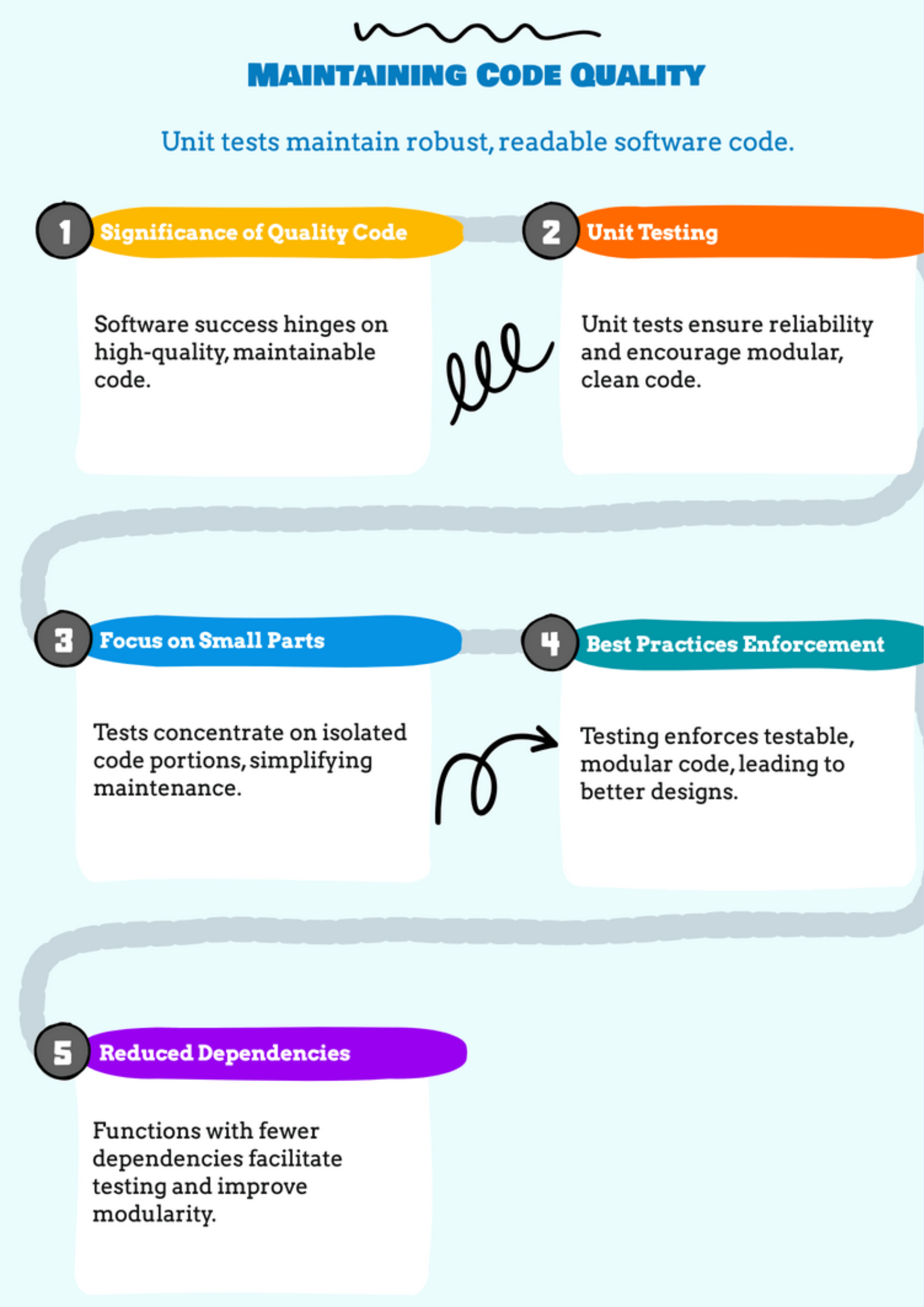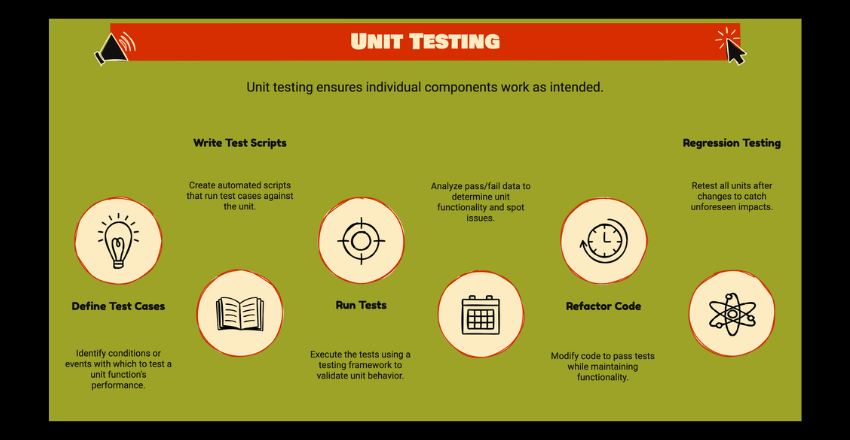Unit testing often gets pushed to the sidelines in the rush of meeting project deadlines. Many believe that writing code without unit tests saves time. Yet, they encounter roadblocks when their code later fails due to unforeseen bugs or changing requirements.
Instead of viewing unit testing as a burden, I’ve seen it act as a safety net during my years of programming. It catches errors before they multiply, saving uncountable hours of debugging and maintenance.
I can tell you that the initial time investment in unit testing pays off tenfold in the long run. It’s your secret weapon for writing maintainable code.
The False Economy of Skipping Unit Tests

Imagine you’re building a house. Would you skip the step of laying a solid foundation to save time? Of course not. Skipping unit tests is like building on shaky ground. You might save time initially, but the structure will eventually crumble.
Unit tests are the bedrock of reliable software. They ensure your code’s stability and functionality from the ground up.
Consider this simple code for calculating the sum of two numbers:
def add(a, b):
return a + bThis looks foolproof. But what if someone later changes the function to subtract instead of add?
def add(a, b):
return a - bWithout a unit test, this bug might go unnoticed until it’s too late. With a unit test, the error is caught immediately:
import unittest
class TestMathFunctions(unittest.TestCase):
def test_add(self):
self.assertEqual(add(2, 3), 5)
self.assertEqual(add(-1, 1), 0)
self.assertEqual(add(-1, -1), -2)
if __name__ == '__main__':
unittest.main()The Safety Net of Unit Testing
Unit tests act as your safety net. They catch errors early in the development process. This prevents small mistakes from snowballing into larger issues. Bugs discovered later in the development cycle are more costly to fix. They often require reworking large portions of code. Unit testing helps avoid this by identifying problems early on.
Unit tests are particularly crucial in large projects. With many developers working on different parts of the codebase, the chances of introducing bugs are high. Unit tests serve as a safeguard, ensuring that any changes made do not break existing functionality. This collaborative safety net is indispensable in maintaining code integrity.
Speeding Up the Debugging Process
Debugging is often a time-consuming process. It involves identifying, isolating, and fixing the issue. Unit tests simplify this process. They provide a clear indication of which part of the code is failing. This speeds up the debugging process, allowing you to resolve issues faster.
For example, if a unit test fails, you immediately know which function or module is responsible. This targeted approach reduces the time spent hunting for bugs. Instead of sifting through the entire codebase, you focus on a specific area. This efficiency is one of the key benefits of unit testing.
Maintaining Code Quality

High-quality code is essential for the success of any software project. Unit tests ensure your code remains robust and reliable. They encourage developers to write cleaner, more modular code. Each unit test focuses on a small, isolated part of the code. This makes it easier to understand, maintain, and refactor.
Moreover, unit tests enforce best practices. They promote writing code that is testable and modular. This often leads to better design decisions. For instance, functions with fewer dependencies are easier to test. This modularity improves code readability and maintainability.
Adapting to Changing Requirements
Software requirements often change. Unit tests provide a safety net when modifying existing code. They ensure new changes don’t introduce bugs. This makes it easier to adapt to changing requirements. You can confidently make changes, knowing your unit tests will catch any issues.
Changing requirements are a constant in software development. Whether it’s a new feature or a change in existing functionality, the risk of introducing bugs is high. Unit tests mitigate this risk. They ensure that the new changes do not break the existing functionality. This adaptability is crucial for long-term project success.
Increasing Developer Confidence
Unit tests boost developer confidence. They provide assurance that the code works as expected. This is particularly important in collaborative environments. Developers can make changes without fear of breaking existing functionality. Unit tests provide immediate feedback, highlighting any issues.
For new team members, unit tests serve as a form of documentation. They show how different parts of the code are expected to behave. This makes onboarding easier and faster. New developers can quickly understand the codebase and start contributing effectively.
Facilitating Continuous Integration

Continuous Integration (CI) relies on automated tests. Unit tests are a key component of this process. They ensure new code integrates seamlessly with the existing codebase. CI systems run unit tests automatically whenever changes are made. This provides immediate feedback and helps maintain code quality.
In a CI environment, unit tests act as gatekeepers. They prevent faulty code from being merged into the main branch. This automation ensures that the codebase remains stable. It also encourages frequent commits and integration, which are best practices in software development.
Examples of Unit Tests in Action
Let’s look at another example. Suppose we have a function to calculate the factorial of a number:
def factorial(n):
if n == 0:
return 1
else:
return n * factorial(n-1)import unittest
class TestFactorialFunction(unittest.TestCase):
def test_factorial(self):
self.assertEqual(factorial(0), 1)
self.assertEqual(factorial(1), 1)
self.assertEqual(factorial(5), 120)
self.assertEqual(factorial(10), 3628800)
if __name__ == '__main__':
unittest.main()This unit test ensures that the factorial function works correctly for different inputs. By running this test, you can be confident that changes to the factorial function won’t introduce new bugs. This confidence is invaluable in maintaining code quality.
The Hidden Costs of Ignoring Unit Tests
Skipping unit tests might seem like a time-saver in the short term, but it often leads to hidden costs down the line. These costs come in various forms: increased debugging time, longer development cycles, and potential downtime due to unexpected bugs. When issues arise, they often require urgent attention, disrupting planned work and leading to missed deadlines. The initial time saved by not writing tests quickly evaporates, leaving developers scrambling to fix problems that could have been avoided.
Building a Culture of Quality
Creating a culture that values unit testing is crucial for long-term project success. Encourage your team to see unit tests not as an optional extra, but as an integral part of the development process. Celebrate successes when tests catch bugs early. Provide training and resources to help developers write effective tests. This cultural shift can lead to significant improvements in code quality and team morale.
Practical Tips for Writing Effective Unit Tests
Writing unit tests can be daunting for those new to the practice. Here are some practical tips to get started:
- Start Small: Begin by writing tests for critical functions. Gradually expand your coverage as you become more comfortable with the process.
- Be Consistent: Make unit testing a regular part of your development workflow. Consistency helps reinforce the habit and ensures comprehensive test coverage.
- Use Mocking: Mock external dependencies to isolate the unit of code you’re testing. This makes your tests more reliable and easier to maintain.
- Focus on Edge Cases: Pay attention to unusual inputs and scenarios. These often uncover hidden bugs that typical cases might miss.
- Review and Refactor: Regularly review your tests to ensure they remain relevant and accurate. Refactor them as needed to maintain clarity and effectiveness.
Exampe of Unit Testing
To illustrate the real-world impact of unit testing, consider the story of a major e-commerce platform. Initially, the development team viewed unit testing as an unnecessary burden. They prioritized rapid feature development to stay competitive.
However, as the platform grew, so did the complexity of the codebase. Bugs became more frequent and harder to trace. Customer complaints increased, and the team spent more time firefighting than innovating.
Realizing the need for change, the team embraced unit testing. They invested time in writing tests for new and existing code. The transformation was remarkable. Bugs were caught early, reducing the number of issues that reached production. Development became more predictable and less stressful. The platform’s stability improved, leading to increased customer satisfaction and retention.
Final Thoughts

Unit testing is an essential practice in modern software development. It ensures code quality, reduces bugs, and saves time in the long run. By adopting a culture that values unit testing, you can build more reliable and maintainable software. The benefits extend beyond the immediate development process, contributing to the overall success and sustainability of your projects.
So, don’t view unit testing as a chore. It as a powerful tool that enhances your coding practices. Start small, be consistent, and watch as your software quality improves.
Unit testing is not a burden. It’s an investment that pays off in the long run. It catches errors early, simplifies debugging, maintains code quality, adapts to changing requirements, and increases developer confidence. It facilitates continuous integration and ensures your software remains reliable and robust. By investing time in unit testing, you build a solid foundation for your software.
This saves you time and effort in the long run. Remember, unit testing is your secret weapon for writing maintainable code. Make it an integral part of your development process.
Source Links
https://study.com/academy/lesson/the-importance-of-being-earnest-essay-questions.html
https://www.tpet.com/the-importance-of-being-earnest-interactive-pdf-unit-test/














